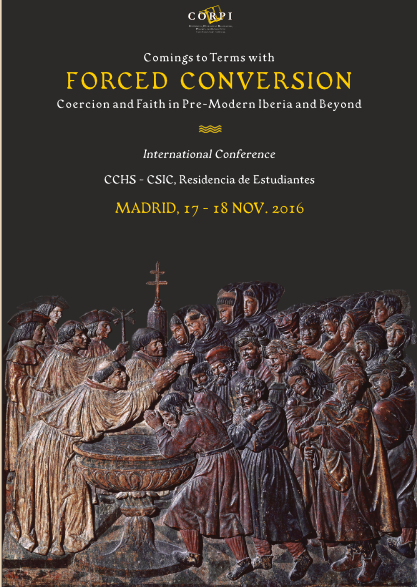
07 Nov Comings to Term with Forced Conversion»
Los días 17 y 18 de noviembre tendrá lugar en la Residencia de Estudiantes de Madrid el congreso internacional «Coming to Terms with Forced Conversion. Coercion and Faith in Pre-Modern Iberia and Beyond», organizado por Mercedes García-Arenal y Yonatan Glazer-Eytan dentro del marco del proyecto CORPI (Conversion, Overlapping, Religiosities, Polemics and Interaction. Early Modern Iberia and Beyond).
Programa:
Thursday, November 17, 2016
INTRODUCTION
9:30 – 10:00 Mercedes García-Arenal and Yonatan Glazer-Eytan
PANEL 1: THE ALMOHADS AND THE WIDER ISLAMIC CONTEXT
CHAIR: Eduardo Manzano (IH-CCHS, CSIC)
10:00 – 10:30 Uriel Simonsohn (University of Haifa): «Women and Conversion to Islam: A Sample Analysis of Medieval Narratives and Legal Problems.»
10:30 – 11:00 Maribel Fierro (ILC-CCHS, CSIC): «Rethinking Forced Conversion in Almohad Times.»
11:00 – 11:30 coffee break
11:30 – 12:00 Alan Verskin (The University of Rhode Island): «Consolation Literature as a Response to the Forced Conversions of the Almohad Period: Maimonides’ Epistle on Martyrdom in the Light of Maimon b. Joseph’s Epistle of Consolation and Ibn ʿAqnīn’s Healing of Souls.»
12:00 – 12:30 Tamer el-Leithy (Johns Hopkins University): «The Limits of Constituted Conversion in Late Medieval Egypt.»
12:30 –13:00 Discussion
13:00 – 14:30 lunch
PANEL 2: GRAPPLING WITH THE RESHAPING OF COMMUNITY
CHAIR: David Nirenberg (University of Chicago)
14:30 – 15:00 David S. Powers (Cornell University): «Mālikī Jurists on the Status of a Synagogue in Touat, ca.1480.»
15:00 – 15:30 Paul Fenton (Paris Sorbonne): «Problems of Integration and Exclusion: The Case of Neo-Muslims of Jewish Origin in Morocco.»
15:30 – 16:00 coffee break
16:00 – 16:30 Ryan Szpiech (University of Michigan): «Enforcing Rabbinical Tradition: The Forced ‘Conversion’ of Castilian Qaraites.»
16:30 – 17:00 Ram Ben-Shalom (Hebrew University of Jerusalem): «Jews and Conversos in Aragon in the Aftermath of the 1391 Riots: the Development of a New Grammar of Conversion.»
17:00 – 17:30 Discussion
Friday, November 18, 2016
PANEL 3: THE VISIGOTHIC MODEL AND ITS USES
CHAIR: Julio Escalona (IH, CCHS-CSIC)
09:30 – 10:00 Elsa Marmursztejn (Université de Reims): «Uses and Echoes of the Visigothic Conciliar Legislation in the Scholastic Controversy on Forced Baptism (13th–14th Centuries).»
10:00 – 10:30 Rosa Vidal Doval (Queen Mary, University of London): «Visigothic Legislation and the Converso Problem in Late Medieval Spain.»
10:30 – 11:00 Isabelle Poutrin (Paris-Est, Créteil): «Proving the Extortion of Consent in Conversion, Apostasy and Other Circumstances of Life. Some Theorizations in Canon Law (16th–17th Centuries).»
11:00 – 11:30 Discussion
11:30 – 12:00 coffee break
PANEL 4: BETWEEN DISSIMULATION AND MARTYRDOM
CHAIR: Luis Bernabé-Pons (Universidad de Alicante)
12:00– 12:30 Yonatan Glazer-Eytan (CORPI, Johns Hopkins University): «Idolatry, Inquisition, Intention.»
12:30 – 13:00 Miriam Bodian (University of Texas-Austin): «Crypto-Jewish Dissimulation and Martyrdom: Ambivalent Values.»
13:00 – 13:30 Gerard A. Wiegers (University of Amsterdam): «Martyrdom and Eschatological Reward: Crypto-Islam and the Salvation History of the Parchment of the Turpiana Tower and the Granadan Lead Books.»
13:30 – 14:00 Discussion
14:00 – 15:30 lunch
PANEL 5: THE LIMITS OF FORCED CONVERSION
CHAIR: Fernando Rodríguez Mediano (CORPI, ILC-CCHS, CSIC)
15:30 – 16:00 Marisa Bueno (POCRAM, Paris-Est, Créteil): «Are You Still My Wife? Conversion to Christianity and Its Legal Effects on the Pre-Existing Marriage and Their Offspring in Late Medieval Castile.»
16:00 – 16:30 Tamar Herzig (Tel Aviv University): «The Forced Conversion of Convicted Jewish Criminals in 15th-Century Italy.»
16:30 – 16:45 coffee break
16:45 – 17:15 Mercedes García-Arenal (CORPI, ILC-CCHS, CSIC): «Was Forced Conversion Efficacious?»
17:15 – 17:30 Discussion
17:30 – 18:00 David Nirenberg Concluding Remarks
Decárgate aquí el programa en pdf.



No Comments